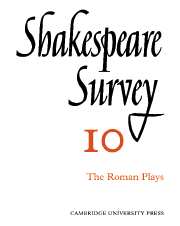Book contents
- Frontmatter
- Shakespeare’s Roman Plays: 1900–1956
- Shakespeare’s ‘Small Latin’—How Much?
- Shakespeare and the Elizabethan Romans
- The Metamorphosis of Violence in Titus Andronicus
- From Plutarch to Shakespeare: A Study of Coriolanus
- The Composition of Titus Andronicus
- Classical Costume in Shakespearian Productions
- Shakespeare’s Use of a Gallery over the Stage
- Lear’s Questions
- “Egregiously an Ass”: The Dark Side of the Moor. A view of Othello’s Mind
- Shakespeare in Schools
- Shakespeare Festival, Toronto, Canada
- International Notes
- Shakespeare Productions in the United Kingdom: 1955
- Drams of Eale, A Review of Recent Productions
- The Year's Contributions to Shakespearian Study 1 Critical Studies
- 2 Shakespeare’s Life, Times and Stage
- 3 Textual Studies
- Books Received
- Index
- Plate Section
Shakespeare’s Roman Plays: 1900–1956
Published online by Cambridge University Press: 28 March 2007
- Frontmatter
- Shakespeare’s Roman Plays: 1900–1956
- Shakespeare’s ‘Small Latin’—How Much?
- Shakespeare and the Elizabethan Romans
- The Metamorphosis of Violence in Titus Andronicus
- From Plutarch to Shakespeare: A Study of Coriolanus
- The Composition of Titus Andronicus
- Classical Costume in Shakespearian Productions
- Shakespeare’s Use of a Gallery over the Stage
- Lear’s Questions
- “Egregiously an Ass”: The Dark Side of the Moor. A view of Othello’s Mind
- Shakespeare in Schools
- Shakespeare Festival, Toronto, Canada
- International Notes
- Shakespeare Productions in the United Kingdom: 1955
- Drams of Eale, A Review of Recent Productions
- The Year's Contributions to Shakespearian Study 1 Critical Studies
- 2 Shakespeare’s Life, Times and Stage
- 3 Textual Studies
- Books Received
- Index
- Plate Section
Summary
The Stratford International Shakespeare Conference of 1955, which was centred on the Roman Plays, not only furnished a happy example of critical co-operation, but showed how deeply these plays engage the interest of present-day Shakespearians. It is evident that the concern of critics has, over the past half-century, tended to concentrate on a rather later period of Shakespeare’s career than had previously been customary, and it is not entirely a result of the chronological basis of arrangement that the plays linked with King Lear by L. C. Knights under the title ‘King Lear and the Great Tragedies’ in the Pelican Age of Shakespeare (1955) are not the other three of Bradley’s ‘great four’, but Macbeth, Antony and Cleopatra and Coriolanus.
The early years of the century saw a number of substantial studies along later-nineteenthcentury lines, culminating in M. W. MacCallum's Shakespeare's Roman Plays (1910). After a less fruitful interlude, a second notable period begins with the publication of Harley Granville- Barker's first series of Prefaces (1927), soon followed by G. Wilson Knight's The Wheel of Fire (1930). It is not yet possible to distinguish any more recent date of cardinal importance, but perhaps the last few years have seen a heightened concern for an eclectic approach to the plays, with a certain bias towards stressing, in L. C. Knights' phrase, Shakespeare's "political wisdom".
- Type
- Chapter
- Information
- Shakespeare Survey , pp. 1 - 11Publisher: Cambridge University PressPrint publication year: 1957
- 1
- Cited by



